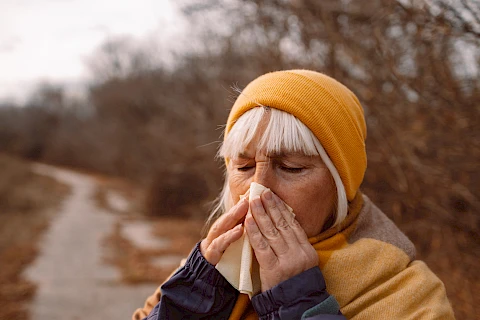
Fall can be a challenging time for seniors who suffer from allergies. As the seasons change, the air fills with allergens that can make daily living uncomfortable. Effective allergy management is vital for seniors to maintain their quality of life and caregivers have a vital role in supporting seniors through this season.
From minimizing allergen exposure to working with healthcare providers, there are various ways to help, and Senior Helpers Buffalo will explore them all.
Common Fall Allergens
Several allergens are particularly troublesome in the fall. Knowing what these are can help in taking specific actions to reduce their impact.
- Ragweed pollen is a common allergen that peaks in the fall. Its pollen can travel for miles, making it hard to avoid.
- Piles of leaves and damp conditions can also lead to an increase in mold spores, which are harmful to seniors with allergies.
- Dust mites thrive in warm, humid conditions and can be found in homes, making indoor air quality a concern.
- Exposure to pet dander can also increase as seniors spend more time indoors during the colder months.
Allergy Management Strategies for Seniors
Minimizing exposure to allergens can help seniors manage their symptoms better. Here are some allergy management strategies to help seniors this fall:
- Use air purifiers with HEPA filters to trap various airborne allergens. Regular cleaning and dusting can also help reduce dust mites and other allergens in the home.
- Keep windows closed on high pollen days to prevent outdoor allergens from coming inside. If seniors are planning on being outside, monitor local pollen counts to plan outdoor activities accordingly. Time outdoor activities for late afternoon or evening when pollen counts are usually lower and encourage seniors to wear protective clothing and masks when going outside for an extra layer of protection.
Working With Healthcare Providers
Regular check-ups and consultations with healthcare providers are also important for effective allergy management for seniors. These visits allow for monitoring any changes in allergy symptoms and adjusting treatment plans as necessary. Open communication about specific symptoms and possible triggers can help healthcare providers recommend the most effective treatments.
Medication management is a prime aspect of allergy care. Over-the-counter options like non-prescription antihistamines, decongestants, and nasal sprays can provide relief from allergy symptoms. For more severe allergies, doctors may prescribe stronger medications such as corticosteroids or antihistamines. In some cases, allergy shots or sublingual immunotherapy may be advised to help build tolerance to specific allergens.
Work closely with seniors' healthcare providers to develop a comprehensive allergy management plan tailored to their needs. This personalized approach ensures that each senior receives the care they need to manage their allergies effectively.
Senior Helpers Can Assist With Fall Allergy Management
From understanding common fall allergens to implementing strategies for minimizing exposure, there are numerous ways caregivers can help. Regular check-ups and open communication with healthcare providers ensure that each senior receives the care they need. Taking proactive steps now can make a significant difference in seniors' quality of life during the fall allergy season.
If you or a loved one need professional caregiving support, contact us at Senior Helpers Buffalo. We proudly serve the communities of Buffalo, Depew, Lancaster, Getzville, and Bowmansville. Let us help your loved ones navigate allergy season with ease.